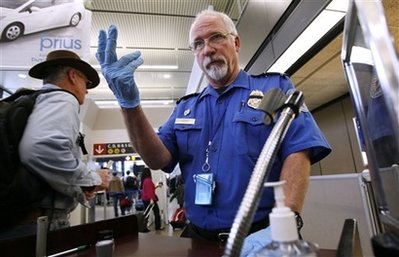
Four American Muslim men claim the Federal Bureau of Investigation placed them on a no-fly watchlist to try to coerce them into serving as government informants even though none of them were a threat to aviation security, according to a federal lawsuit filed Tuesday.
The suit claims that the Federal Bureau of Investigation has wielded the threat of placement on the no-fly list as tool to try to coerce the four Muslim Americans, who have no criminal records, into serving as confidential informants. The government was either attempting to intimidate them into becoming informants or to retaliating against them for declining its requests, the suit said.
The complaint accuses US Attorney General Eric Holder, FBI Director James Comey, and various other high-ranking government officials of creating an atmosphere in which innocent Muslims are targeted and forbidden from flying unless they are willing to serve as government spies against members of their own communities.
"I do not want to become an informant, but the government says I must in order to be taken off the no-fly list" Awais Sajjad, one of the named plaintiffs, told Ars in a phone interview on Wednesday.

The FBI declined comment.
Sajjad, of Brooklyn, said that the problems started two years ago, when he was attempting to board a flight to Pakistan to visit his family, including his ailing 93-year old grandmother. Instead, he was told by FBI agents that he was on the no-fly list and could not board.
"After he sought removal from the list, he was approached by FBI agents and subjected to extensive interrogation, including a polygraph test, after which he was asked to work as an informant for the FBI," according to the lawsuit. Sajjad, who is a lawful permanent resident, declined. "How can the government tell me that the only way I can see my family again is if I turn my back on my community?"
He has been unable to visit his family in Pakistan since February 2012.
Sajjad's attorneys, Susan Hu from the Center for Constitutional Rights and Diala Shamas from the CLEAR project (Creating Law Enforcement Accountability and Responsibility) told Ars that, prior to filing this suit, Sajjad had exhausted all other possible administrative procedures. They explained that, upon learning of his no-fly list status, he immediately filed a Department of Homeland Security Traveler Redress Inquiry Program (TRIP) application, as well as an appeal a year later. But never heard back from DHS regarding either this initial application or appeal.
Hu and Shamas also said that their clients' constitutional due process and free speech rights have been violated. The no-fly redress procedures, they argued, fail to provide any meaningful notice or opportunity to see or challenge the allegations that gets someone placed on the list. Additionally, their clients' placement on the no-fly list, allegedly in retaliation for exercising their rights to not become informants, violates their First Amendment rights, the lawyers said.
"The lack of transparency is the biggest problem here," Hu said. "It's not enough for the government to tell the American people to trust us. Especially when you have clear instances of abuse."
Hu further described what the plaintiffs hope to accomplish in suing the government: "Our clients are not a risk to aviation security. So the government should tell them that they are off the no-fly list. They also need to create adequate safeguards so that our clients have opportunity for notice and a fair hearing. We hope to make the whole process more transparent."
Sajjid and his three co-plaintiffs have an uphill battle judging by the plight of another Muslim who sued to have her name removed from the no-fly list. A Malaysian professor named Rahinah Ibrahim, who was placed on the no-fly list due to administrative error almost a decade ago, has been fighting her placement on various government blacklists within the Terrorist Screening Database (TSDB) ever since.
Ibrahim learned last week that, despite the fact that the US does not consider her a terrorism threat, she still cannot actually re-enter the US. Why? That's classified: her name remains in the Terrorist Screening Database (TSDB).
Documents in the case reveal that the government has used a secret exemption to the "reasonable suspicion" standard to keep her name in the terrorist screening database, despite the judge ordering her removal from it.
Ibrahim, who currently lives in Malaysia, was unable to attend her own December trial in the US because she could not obtain a Visa.
The dispute originally stemmed from an errant check placed on a form regarding Ibrahim, filled out by an FBI agent many years back. Ibrahim learned of her placement in the TSDB when she attempted to board a plane from San Francisco to Hawaii back in 2005 and was denied entry. At trial, that agent, Kevin Kelley admitted his mistake, and government lawyers conceded that Ibrahim never has posed a threat to national security.
"The government can put people on watchlists even if there are not facts that support conclusions that they're involved in terrorist activities," said Elizabeth Pipkin, Ibrahim's attorney. "One can imagine group identity or statistical analysis, where the government is drawing correlations with respect to a particular individual. Given all of the data analysis and mining employed by the government, individuals can be drawn into analysis that doesn't necessarily show criminal involvement, just problematic algorithmic correlations."
reader comments
158